A 2006 Look at The Godfather
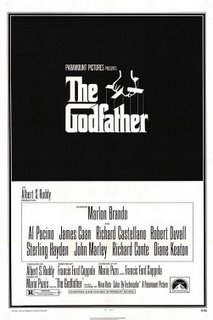 The Godfather
The Godfather
Directed by Francis Ford Coppola
Written by Coppola and Mario Puzo from his novel
Paramount Pictures
Original Release Date: March 15, 1972 in New York and then March 24 for the rest of the country.
I haven't ever really tried to tackle a classic movie for review. Today I went to Nashville's historic Belcourt Theatre and watched this incredible movie on a big screen.
The hardest thing for me to decide how to write about a movie like this is finding an approach. I've read numerous anecdotes on the film from then-Paramount-head-honcho Robert Evans's
book The Kid Stays in the Picture and in Peter Biskind's Easy Riders, Raging Bulls. It's lines, scenes, and performances are legendary. It got nominated for 11 Oscars and won Best Picture. It's in the AFI's top 100 of all-time at #3.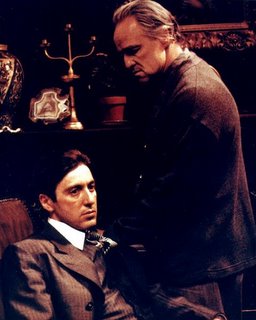 What makes the movie one of the best you'll ever see is that you can pick it up at any time and be riveted. There are very few movies that hit that kind of stride. After 34 years, it shows no real signs of age--if it weren't for the aging process of actors and film quality, you wouldn't be able to detect when this movie was made.
What makes the movie one of the best you'll ever see is that you can pick it up at any time and be riveted. There are very few movies that hit that kind of stride. After 34 years, it shows no real signs of age--if it weren't for the aging process of actors and film quality, you wouldn't be able to detect when this movie was made.
Once you get into the history of how all the pieces came together for The Godfather, you'll also realize how much of a miracle it is that this movie was made. Hollywood was giving more and more power to the directors, rather than the producers. Coppola had made nothing but bombs but was still pegged to direct after many had been approached but declined. That Al Pacino is Michael Corleone is a miracle. And, before Jaws, became one of the huge factors in changing the way movies were distributed and why the opening weekend gross has become such a critical aspect of a movie's success. What I like about the movie is how, at heart, it's the story of one man's improbable rise to power. In the scope of the film's influence and famous scenes, what almost gets lost is the basic story. Michael Corleone (Pacino) is a World War II hero coming back home, ready to make a nice life with the non-Sicilian Kay Adams (Diane Keaton). He's his father Vito's (Marlon Brando, who won an unclaimed Oscar) favorite, and as such, he's supposed to be the guy who made it on the outside of the family business. But a series of events slowly draws him in. The other families want to get into narcotics, with the Corleone's pull in politics and law enforcement. Don Corleone believes the trade is a bad idea, feeling his influence would be lost and hence, his power. A hit is put on the Don, leaving him weak, his son Fredo (John Cazale) in shock, and his volatile son Sonny (James Caan) in charge.
What I like about the movie is how, at heart, it's the story of one man's improbable rise to power. In the scope of the film's influence and famous scenes, what almost gets lost is the basic story. Michael Corleone (Pacino) is a World War II hero coming back home, ready to make a nice life with the non-Sicilian Kay Adams (Diane Keaton). He's his father Vito's (Marlon Brando, who won an unclaimed Oscar) favorite, and as such, he's supposed to be the guy who made it on the outside of the family business. But a series of events slowly draws him in. The other families want to get into narcotics, with the Corleone's pull in politics and law enforcement. Don Corleone believes the trade is a bad idea, feeling his influence would be lost and hence, his power. A hit is put on the Don, leaving him weak, his son Fredo (John Cazale) in shock, and his volatile son Sonny (James Caan) in charge.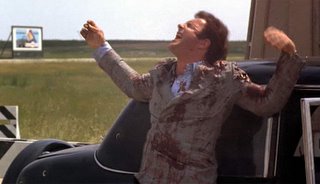 Michael feels obligated to help, and he soon leaves the life he had made for himself. Because he is viewed as a respectful, cooler head, he becomes the negotiator for the Corleones in a time where everyone is looking for revenge. But this underestimation becomes his strength in the early going--it leads to the famous restaurant scene where he takes out Sollozzo (Al Lettieri), the man responsible for the hit on his father, and the police chief McClusky (Sterling Hayden), leading to his exile to Sicily while things heat up.
Michael feels obligated to help, and he soon leaves the life he had made for himself. Because he is viewed as a respectful, cooler head, he becomes the negotiator for the Corleones in a time where everyone is looking for revenge. But this underestimation becomes his strength in the early going--it leads to the famous restaurant scene where he takes out Sollozzo (Al Lettieri), the man responsible for the hit on his father, and the police chief McClusky (Sterling Hayden), leading to his exile to Sicily while things heat up.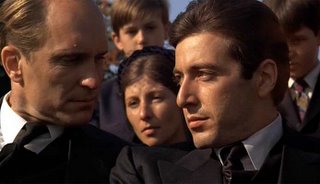
Meanwhile, Sonny's temper becomes his downfall, and when his sister Connie (Talia Shire, Coppola's sister) gets beaten up again by her husband Carlo Rizzi (Gianni Russo), this after Sonny has already beaten him senseless for that very thing, it becomes an opportunity for the other families to kill the vengeful Sonny, in yet another famous scene. The recovering Don calls a truce, but it's a clever ruse to get Michael back in the States and take over. His authority isn't immediately recognized, but he soon shows why he's a man to be respected.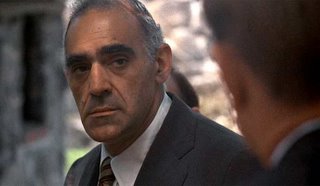
It would require a great deal of change to make an epic like this again. Studios aren't what they used to be. They are now primarily owned by other, larger companies and movies make a tiny fraction of their profits. Francis Ford Coppola had the power in the seventies to make this kind of movie, but he soon got a big head after all of that success--and after his eccentricities on Apocalypse Now drove the costs of that movie to unimaginable heights, and the expensive debacle of The Cotton Club blew up in his face, coupled with all of the other directors who abused their power gained from the new Hollywood direction, movies began to be produced chiefly by, well, accountants. It's why the eighties studio mindset started catering to what they thought people most enjoyed, using what worked in the past and having a heavy reliance on test screenings to produce films, rather than original ideas.
Sure, we see a really good movie now and then, mostly made from the independents, who have also suffered from the weight of financial expectation. Lots of independent studios have come and gone because they'll get that one big hit and then they expect everything to be that big. It was a sort of downfall for Miramax.
And I'm not here to say that nothing is good anymore, that only movies from the 70s and before are the only good ones. There are plenty of good ones every year, and occasionally, we'll even get a movie that is as watchable as The Godfather. But a seeing a movie like this today shows how much things have changed. A major studio today would make The Godfather completely different--I don't think it would be nearly as good. The dialogue would be different, the way scenes would play out would be different--it'd be an interesting experiment. When is the last time you saw a three hour movie that was never boring? Even the huge, much-loved studio movies of our era like Braveheart, Titanic, and the LOTR trilogy have flaws that are only ignored because most of the rest of those respective movies are very good.
The Godfather is perfect. You couldn't get 100 directors to film this movie independently of each other and come out with a better product. And, what gives this movie some extra bonus points is that even under the weight of expectation, it still delivers. Growing up, you hear about those classics like Citizen Kane and when you finally watch it, you say, "Is that what the fuss was about?" Kane does not hold up well under the expectation--as a film geek I can admire it for all of the technical breakthroughs it made, and as a story it's still very intriguing. But best movie ever made it is not. And I know that some people will read those lines above and say, "This guy doesn't like Citizen Kane." That's not true--but I challenge you to watch Kane and The Godfather and tell me that Kane is the movie you'd rather watch over and over.
In other words, what a movie. I haven't had a better time in recent memory watching a movie than watching this on the big screen. If this is something that ever finds its way into your town on a big screen, go see it. It isn't to be missed.

0 Comments:
Post a Comment
<< Home